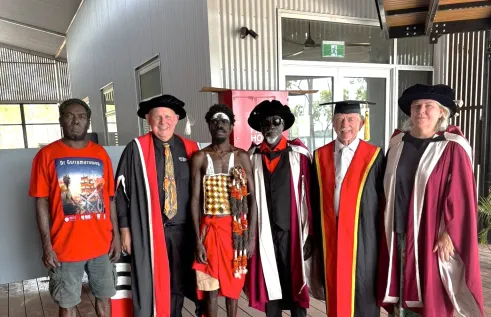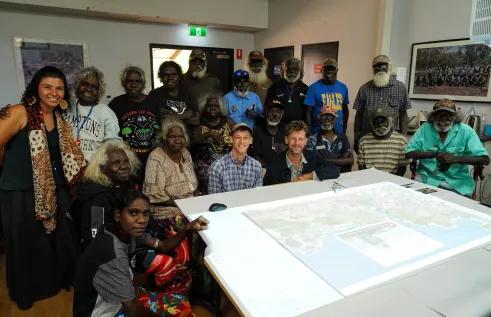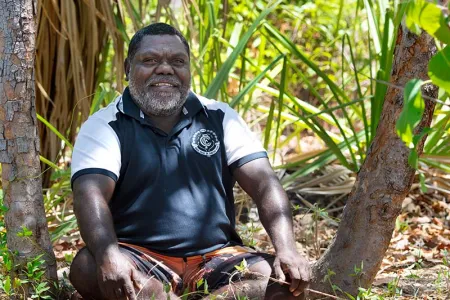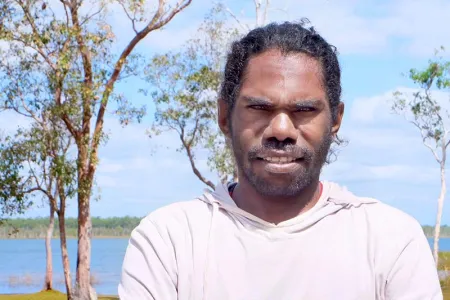NEWS ARTICLE
Indigenous graduates celebrate recognition of research skills
Indigenous researchers working on country are having their specialist knowledge recognised by a new credentialing system offered through CDU.
The Northern Institute is delivering three credentials for Indigenous people working in community-based research and has celebrated its first two graduates of the program: Stephen Dhamarrandji and Emmanuel Yunupiŋu.
For Stephen, an Elcho Island resident and Djambarrpuyŋu man, achieving the Indigenous Community-based Researcher badge is more than a qualification, it’s recognition of his in-depth knowledge of country, culture and community.
“I’ve done this for my family and my community back on the homelands,” Stephen said. “I want my community to know that anyone can do what I’ve done and get involved in research.”
Stephen earned the community-based researcher credential through a tailored program suited to the grassroots work he undertakes alongside CDU researchers.
“We want more research projects and more Yolŋu involved in these projects,” he said. “It is important to have people in the community who can interpret feedback and find better solutions through research for our younger generations.”
Fellow graduate Emmanuel Yunupiŋu achieved his micro-credentialing badge after working as a co-researcher with the Northern Institute’s Dr Michaela Spencer on a monitoring and evaluation project for the Northern Land Council’s Community Planning and Development program.
Emmanuel said the Indigenous community researcher badge would help ensure research was carried out in the right way in his community of Gapuwiyak.
“By getting involved in research and working with CDU, I can let people know what the research is all about, and make sure all the right people are involved,” he said.
“This is an exciting time for me. I want to get more skills and training so I can be a good leader for my family.”
Micro-credentials, also known as digital badges, are part of a broader roll out of flexible and tailored short form qualifications offered by CDU.
Pro Vice-Chancellor Education Strategy Professor Robert Fitzgerald said micro-credentialing was a new way of recognising core skills in on-the-job contexts.
“Micro-credentials value skills and knowledge that may not currently be recognised through other forms of university study,” Professor Fitzgerald said.
“It is early days, but CDU is exploring the potential for these credentials to expand and be available to students interested in short courses, single units of study or other on-country forms of learning and employment.
“We want our community to know that university study can be more than just a degree, diploma or certificate. There are options for every student.”
In the future, micro-credentials will be offered by various disciplines within CDU, supported by the Education Strategy portfolio.
For more information visit W: https://www.cdu.edu.au/about-cdu/learning-teaching/digital-badges.
Related Articles

First Yolŋu awarded a PhD through CDU
In an Australian first during a special conferral celebration that took place in remote East Arnhem land at Yalakun outstation last week, a late Yolŋu leader from East Arnhem received a Posthumous PhD.
Read more about First Yolŋu awarded a PhD through CDU
3D printed map brings Elders’ knowledge to life
Multimedia and 3D technology are the latest tools being used by Elders in Maningrida to share their traditional knowledge and ancient stories, facilitated by a collaboration between Charles Darwin University academics.
Read more about 3D printed map brings Elders’ knowledge to life
Research reveals how Australians really feel about the world's largest proposed solar farm
Australians are substantially supportive of renewable megaprojects, but their approval begins to wane if the produced energy doesn’t benefit them, according to a new study examining social acceptance of the proposed world’s largest solar plant.
Read more about Research reveals how Australians really feel about the world's largest proposed solar farm

